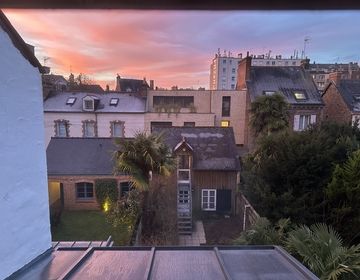What I’ve Learned about French People in a Month in Rennes
To quote the teacher I am working with at a local high school, the French are “very particular people.” Living with a French family and taking classes from French teachers in the past few weeks has taught me that this is true.
One of the biggest things that makes the French distinct is, of course, the French language. One of my favorite French tendencies is adding “quoi” at the end of a sentence (this may be more of a Bretagne thing), or saying “bahh” during a pause in a conversation. There is also, of course, the classic French way of expressing indifference by puffing out your cheeks and making a kind of raspberry sound. The French are also serious about politeness. It is very important to say “bonjour” and “au revoir” when you come into and leave a shop or a restaurant. It is much more likely for a French person to say “bonjour” to you than to smile and give a non-verbal greeting like in the United States.
During the first two weeks of class, I have also been able to experience the French “grèves.” French students are not at all afraid to go into the streets and protest against the government. They often even block the doors of the university with chairs or garbage cans. They believe in the fact that they can demand change from their government, and in the past, French students have actually created change by these types of strikes. The rest of the city, and the school itself, accept these blockages as commonplace.
When there are no strikes, and class is in session, it is vital to be on time, because the French do not kid around about punctuality. If you get to class late and the door is closed, you are expected to knock to ask for permission to enter. Teachers make comments out loud when they pass out assignments, and don’t hesitate to call out a student who is wrong or who is being disrespectful.
In Rennes especially, I have noticed that it is much more acceptable to go out for a drink during the week. However, French students seem more likely to enjoy one or two drinks without going too crazy, like in the United States. You can see students packed into tents in front of bars around 7:00 or 8:00 on Wednesday and Thursday nights, maybe having dinner, and maybe having a drink. Speaking of dinner, it seems like sacrilege for the French to eat dinner before 7:00!
Naturally, all of these things I have noticed don’t apply to absolutely everyone in France. However, it has been fascinating to discover the small nuances of French culture and the habits of French people, and I look forward to learning even more during the rest of my semester in Rennes.
Elizabeth Lacy
St Olaf College
Related Posts

A Day In My Life!
Welcome to a day in my life in Rennes, France! Different from my more routine college life in the States, each day in Rennes looks a little different for me... keep reading

Adapting to Life in a Second Language
My plane landed in Rennes four weeks ago, on the morning of January 9th. I’d spent my last three nights in the United States sleeping on the floor of my... keep reading

L'adaptation culturelle et le mal du pays
Je suis arrivée ici à Rennes il y a un peu plus qu’un mois. On a appris, avant d’arriver et pendant l’orientation, qu’il y a des phases de l’adaptation culturelle... keep reading
